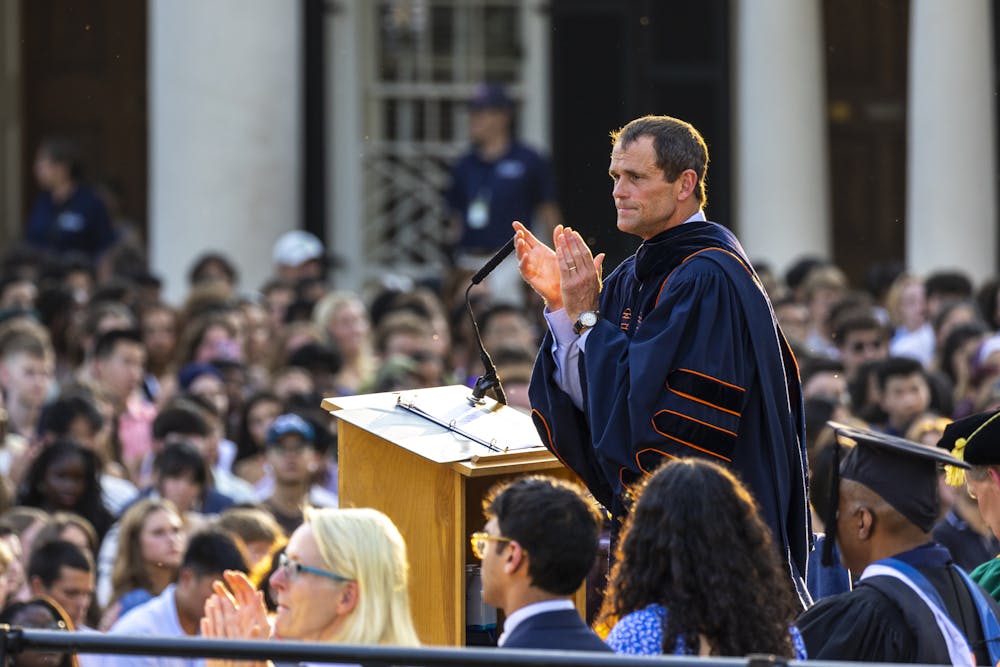New students filed into seats on the lawn Sunday to hear advice and guiding words from faculty and student speakers at convocation. Students dressed up for the event, wearing colorful dresses and polo shirts, despite the heat.
Convocation is a longstanding tradition at the University, throughout which students sit facing the Rotunda. During Final Exercises, students progress down the Lawn away from the Rotunda, coming full circle four years later.
Ian Baucom, executive vice president and University provost, said that although incoming students had already been exposed to orientation and Wahoo Welcome events — a series of events hosted by the University to welcome incoming students to Grounds — this ceremony was the formal start of these students’ journeys at the University.
Much of Baucom’s speech revolved around themes of inclusivity and community at the University — Baucom acknowledged that the University failed at the start of its history to channel equality, but would now work to better these efforts. Gathering on the Lawn for Convocation, Baucom said, is part of the equation.
“[We are] understanding ourselves as the University of a ‘we,’ held together by the pursuit of truth,” Baucom said. “The University of a ‘we,’ all created equal. The University of a ‘we,’ diverse in every way. The University of a ‘we’ that we must contend, that we must commit to constantly expand and build.”
Three touchstones of the University’s foundation, Baucom said, are focuses of the ceremony — Honor, student self-governance and the community of trust.
“We want you to know about those traditions, and we want you to pledge yourself to them because of our unshakeable commitment to the unfettered freedom of thought and inquiry across all our differences of perspective,” Baucom said.
In one such tradition, students at convocation are each given a nickel — the coin whose face features University founder Thomas Jefferson. The gesture is to honor Jefferson, who wanted to be remembered for three things — the author of the Declaration of Independence, author of the Statute of Virginia for Religious Freedom and the “father” of the University.
University President Jim Ryan said the fundamental purpose of the University is to “follow the truth”, an integral mission of the University community and an approach advocated for by Jefferson.
“We are not afraid to follow truth wherever it may lead, nor to tolerate any error so long as reason left is left to combat it,” Ryan said, echoing a quote from Jefferson. “Universities, through research and teaching, discover and disseminate knowledge.”
Students, Ryan said, have an important role to play in this process, and encouraged attendees to “channel curiosity” in their path to becoming citizen leaders.
First-year College student Trisha Nagulagari was among the crowd of first-year students seated on the Lawn among her new classmates. She said she hopes this event brings her class together.
“Everyone's still finding their place right now,” Nagulagari said. “So I think something like this [event] can just show that all of us are in the same boat right now.”
Tichara Robertson, Student Council president and fourth-year College student , Lisa Kopelnik, University Judiciary Committee Chair and third-year College student and Hamza Aziz, Honor Committee Chair and fourth-year College Student, were the student speakers at the event.
Robertson spoke of emotion, particularly anger and its complexity regarding her connection to the University. She shared her experiences as a student experiencing powerful emotions who channeled them to confront social problems, mainly through Student Council.
“I encourage you to take whatever you feel right now and channel it back into this place to build the university that you need,” Robertson said.
Kopelnik spoke about the restorative approach of UJC, which allows students to have a key role in disciplinary action on grounds.
“At U.Va., we are truly and deeply accountable for our mistakes and our faults, but at the same time, every generation of students chooses to grow, to restore, to advocate, to believe in one another — and now it's your turn,” Kopelnik said.
Aziz shared the history of the Honor system at the University and its importance. He encouraged students to have a voice.
“I would also like to acknowledge that honor and the growth it fosters can look deeply personal and different for each of you,” Aziz said. “You should reflect on and expand on the value of honor and how you individually hope to grow from this.”
In June, the Honor Committee enacted the largest changes to the Honor system since its inception, including the implementation of a multi-sanction system — transforming the single-sanction system that had operated since 1842.
Students were then asked to sign the Honor Pledge, and lined up in throngs to put their names on the scrolls which would cement their promises not to lie, cheat or steal at the University.
Following the ceremony, students left five cents richer and attended an ice cream social with Ryan.







